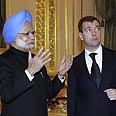
Medvedev with Singh
Photo: AFP
Russian President Dmitry Medvedev on Monday urged greater control over nuclear arms, warning radical elements could threaten neighbors and use the weapons to spark large-scale conflict.
At a joint news conference with visiting Indian Prime Minister Manmoham Singh, Medvedev indicated that Russia is interested in strict control over nuclear weapons "so that they aren't taken hostage by any kind of radicals; so that they won't be used to start any kind of conflict or even threaten neighbors."
More Power
Nuclear chief says Tehran will build 10 more sites like Natanz in bid to generate more electricity
Russia has until recently been hesitant in showing support for new US-led sanctions against Iran in response to its defiance of an enrichment ban. But Tehran's intentions announced at the end of November to build 10 new uranium enrichment plants appeared to have tipped the balance in Moscow in favor of tougher trade punishment.
"I'll say it openly: Moscow has no interest in expanding the nuclear club," Medvedev said.
Singh is in Moscow on a three-day visit to strike a number of defense and energy deals worth several billion dollars.
India hopes to boost uranium fuel imports from Russia, its Cold War ally, and also wants Russian investment in nuclear power stations at home.
'Major step forward'
State news agencies quoted the country's nuclear energy chief Sergei Kiriyenko as saying that Russia may build up to 20 reactors at three sites in India."Nuclear cooperation between the Russian Federation and India in my view has a very big, a very good future," Medvedev said.
Singh said he was "most satisfied" with the talks, which he called "a major step forward."
India is a top Russian arms client, recently securing production licenses for T-90 tanks and contracts to provide Russian aircraft with BrahMos missiles. The countries are building a modern supersonic fighter, equivalent to the US Raptor stealth fighter. But tension has appeared over the cost of refurbishing the Soviet-built aircraft carrier Admiral Gorshkov for the Indian Navy.
India reportedly paid $617 million when it signed the original contract for the ship in 2004, but later the Russian factory carrying out the repairs demanded another $2 billion, which led to a dispute between the two sides.
Work on the carrier was originally supposed to be completed in 2010, with delivery slated for 2012 after tests.
Singh, who was to meet Prime Minister Vladimir Putin later Monday, praised the countries' economic ties, adding they were shooting for $20 billion in bilateral trade by 2015.















